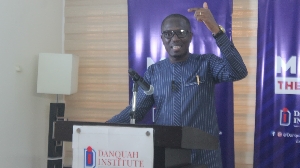Health News of Thursday, 15 November 2012
Source: GNA
Ghana launches 2012 State of the World Population Report
Ghana on Wednesday joined the rest of the world to launch the 2012 State of the world Population Report with a pledge from the Ministry of Health to ensure the availability of contraceptives and commodities.
“We will also ensure that family planning services are made available, accessible and products affordable,” Deputy Minister of Health Mr Robert Joseph Mettle-Nunoo made the pledge when he launched the report in Accra. He said family planning was a human right issue and required the commitment of individuals and couples.
He noted whilst government was struggling to deal with its economic challenges, the rising population and its associated complex inter-relationship with development contributed to the visible slow progress in sustainable socio-developmental goals set by government.
“Practicing family planning is an opportunity for individuals and couples to give birth to the number of children they want to have and care for. Give them the quality of life they need and contribute to national development. This is what is known as having children by choice and not by chance”.
The theme for the global launch was “By Choice Not by Chance: Family Planning Human Rights and Development” which seeks to underscore FP as a human right and a development issue aimed towards having children by choice and not by chance.
Deputy Minister of Health, said often times family planning was seen as a birth control method and that was met with resistance from the general public and advised the public to see family planning as a human right issue for a better understanding and acceptance of the concept.
“This way we are likely to improve the contraceptive prevalence rate from the current 23 per cent to an appreciable value that can positively impact the anticipated accelerated reduction of Ghana’s maternal mortality ratio and maternal morbidity,” he said.
He noted that the shortage of contraceptives world-wide were said to be the one reason why millions of people were still unable to exercise their right to family planning and access to family planning was restricted by factors such as poverty, negative social pressures and gender inequality and discrimination.
It is estimated that 222 million women lack access to reliable, high quality family planning services, information and supplies putting them at risk of unintended pregnancies.
The huge unmet needs for family planning persist despite all the international agreements and human rights treaties that promote individual’s rights to make their own decisions about when and how often to have children.
He explained that ensuring access to all men and women, women and young people required a multipronged effort, enforcement of the laws, reducing poverty, strengthening health systems, removing logistical impediments and ensuring a wide range of supplies.
He called for the need to offer the needed guidance for the youth to help them to count the cost of not practicing family planning, to ensure that maternal mortality and morbidity was curbed.
According to the report, research conducted by the United Nations Population Fund (UNFPA) showed that of the 80 million unintended pregnancies that are projected to occur in 2012, an estimated 40 million will likely end in abortion and that where FP supplies, information and services were are available, abortion rates are low.
The UNFPA Country Representative, Dr Bernard Coquelin, called for the urgent need for Ghana to put measures in place to ensure that the needs of the thousands of women, who could not access family planning services, were met.
He called on the development partners to sustain the their efforts in advocating family planning and enhance their collective actions and resources in support of the Ghana government in achieving access to quality family planning services.
Ms Marian Kpakpah, Technical Director at the National Population Council, expressed concern about the growing population in developing countries without a corresponding rapid infrastructural development and urged government to make greater investment in family planning programmes.
The UNFPA handed-over contraceptives to the Ghana Health Service in support of Ghana’s reproductive health programmes.











